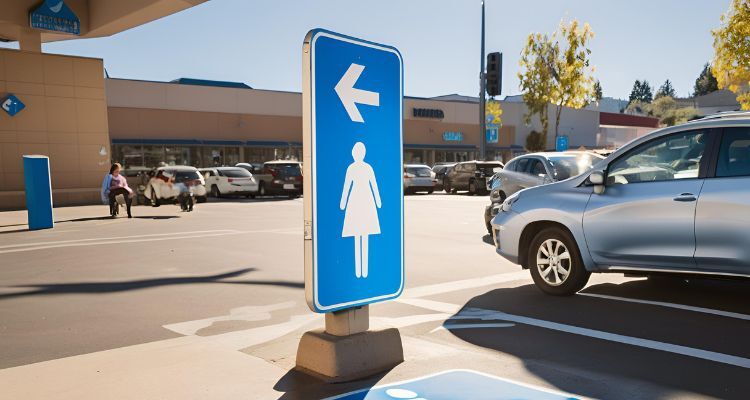
How to Renew or Extend a Disabled Parking Permit After Pregnancy
Introduction
Pregnancy is a life-changing experience that brings a host of physical, emotional, and psychological changes. For many women, the physical demands of expecting a child can lead to mobility challenges, prompting the need for a disability pass. These disability passes provide essential support by allowing expectant mothers to park closer to their destinations, thereby reducing physical strain and improving accessibility. However, the need for a disability pass does not always end with childbirth. Many women continue to experience mobility issues in the postpartum period due to complications from delivery, ongoing medical conditions, or the physical demands of caring for a newborn.
This article aims to provide a comprehensive guide on how to renew or extend a disability pass after pregnancy, particularly if mobility issues persist postpartum. We will explore the reasons why a renewal or extension might be necessary, the steps involved in the renewal process, and the specific considerations for postpartum women. Additionally, we will discuss the importance of consulting with healthcare providers to determine the appropriate course of action.
Understanding Disabled Parking Permits: A Refresher
What Is a Disabled Parking Permit?
A disabled parking permit, also known as a handicap placard or disabled person parking placard, is a special pass issued by state authorities that allows individuals with mobility impairments to park in designated spaces. These spaces are typically closer to building entrances and are wider than standard parking spaces, providing additional room for maneuvering.
Types of Disability Passes
Handicap tags come in various forms, depending on the nature and duration of the mobility impairment:
Permanent Passes: Issued to individuals with long-term or permanent disabilities. These passes usually need to be renewed every few years.
Temporary Passes: Issued to individuals with short-term mobility impairments, such as those related to pregnancy or recovery from surgery. These passes are typically valid for a limited period, ranging from a few weeks to several months.
Placards: Portable passes that can be displayed in any vehicle in which the authorized holder is traveling. Placards are particularly useful for individuals who may use different vehicles.
License Plates: Issued to vehicle owners who have a disability, these plates are affixed permanently to the vehicle and serve the same purpose as placards.
Eligibility Criteria
Eligibility for a disability tag typically requires a medical certification from a licensed healthcare provider, confirming that the applicant has a condition that significantly impairs their mobility. Conditions that may qualify for a disability tag include chronic illnesses, injuries, and temporary conditions such as pregnancy-related complications.
The Application Process
Applying for a disabled parking permit during pregnancy involves obtaining medical certification, completing the required application forms, and submitting them to the relevant state agency, usually the Department of Motor Vehicles (DMV). Once the application is approved, the tag is issued and can be used immediately.
Understanding Disabled Parking Permits for Pregnant Women
The Need for Disability Passes Throughout Gestation
Pregnancy brings about a myriad of changes in a woman's body, including weight gain, changes in the center of gravity, swelling of the feet and ankles, and back pain. These changes can make walking long distances challenging, especially in the later stages of gestation. Accessible tags are designed to help mitigate these challenges by allowing closer access to buildings and facilities.
How to Apply for a Disabled Parking Permit While Expecting a Child
If a pregnant woman experiences mobility issues that make it difficult to walk 200 feet without rest or assistance, she may qualify for a temporary parking pass. The process typically involves the following steps:
Consultation with a handicapMD Healthcare Provider: The first step is to consult with a handicapMD healthcare provider who can assess the severity of the mobility issues. The healthcare provider must certify that the pregnancy-related condition warrants the use of a disability pass.
Filling Out the Application: Each state in the U.S. has its own application form for a disability pass. The form generally requires personal information, details of the condition, and certification from a licensed healthcare provider.
Submission of the Application: The completed application form, along with any required documentation (such as proof of pregnancy and a medical certification), must be submitted to the state's Department of Motor Vehicles (DMV) or equivalent agency. This can often be done in person, by mail, or in some cases, online.
Issuance of the Permit: If the application is approved, a temporary parking pass will be issued, usually valid for a period of three to six months. The special tag is typically a placard that must be displayed on the rearview mirror of the vehicle when parked in a designated disabled parking space.
Expiration of the Disability Tag Post-Pregnancy
Temporary accessible tags issued duringyour motherhood journey are generally time-limited and are expected to expire shortly after the estimated due date. However, in some cases, the mobility issues experienced during pregnancy may persist postpartum, necessitating the renewal or extension of the disability tag.
Postpartum Mobility Challenges
Why Mobility Issues May Persist After Pregnancy
While being in a pregnant state itself is temporary, the physical effects can extend well into the postpartum period. Several factors can contribute to ongoing mobility issues after childbirth:
1. Recovery from Childbirth
Childbirth is a physically demanding process that can leave women with a range of recovery-related issues, including perineal pain, cesarean section recovery, and pelvic floor dysfunction. These conditions can make it difficult to walk, stand, or move comfortably, leading to ongoing mobility challenges.
2. Complications from Delivery
Some women experience complications during delivery that result in long-term mobility issues. For example, nerve damage, pelvic fractures, or severe tearing can lead to prolonged recovery times and require additional medical intervention.
3. Postpartum Depression and Anxiety
Postpartum depression and anxiety can also impact physical health, leading to fatigue, lethargy, and a reduced ability to perform daily tasks. These mental health conditions can exacerbate physical discomfort and make it difficult for new mothers to regain their mobility.
4. Ongoing Medical Conditions
Women with pre-existing medical conditions, such as arthritis or diabetes, may find that their condition worsens during the maternal phase and continues to affect their mobility postpartum. In such cases, a disability tag may be necessary for an extended period.
5. Physical Demands of Caring for a Newborn
The physical demands of caring for a newborn, including lifting, carrying, and feeding, can place additional strain on a woman's body. This strain can lead to musculoskeletal pain, back injuries, and other issues that impair mobility.
When to Consider Renewing or Extending a Disability Pass
Given the potential for ongoing mobility challenges, it is important for new mothers to assess their physical condition in the weeks and months following childbirth. If mobility issues persist, renewing or extending a disability tag may be necessary. Some indicators that a renewal or extension is needed include:
- Difficulty Walking or Standing for Extended Periods: If you continue to experience pain, discomfort, or difficulty walking or standing, a disability tag may still be necessary.
- Inability to Perform Daily Tasks: If mobility challenges prevent you from performing daily tasks such as grocery shopping, attending medical appointments, or caring for your child, a renewal or extension should be considered.
- Ongoing Medical Treatment: If you are receiving ongoing medical treatment for postpartum complications, your healthcare provider may recommend that you renew or extend your pass to accommodate your needs.
Renewing or Extending a Disabled Parking Permit After Pregnancy
Assessing the Need for Renewal or Extension
After childbirth, some women may continue to experience mobility issues such as lingering pelvic pain, severe back pain, or complications from a cesarean section. If these issues make it difficult to walk without assistance or rest, a renewal or extension of the handicap tag may be necessary.
Steps to Renew or Extend a Disabled Parking Permit
Step 1: Consult with Your handicapMD Healthcare Provider
The first step in renewing or extending a disability pass is to consult with your handicapMD healthcare provider. They can assess your physical condition and determine whether you continue to meet the criteria for a disability pass. If your mobility challenges persist, your healthcare provider can provide the necessary medical certification to support your renewal or extension request.
Importance of Medical Certification
Medical certification is a crucial component of the renewal or extension process. It serves as official documentation that confirms your ongoing need for a disability pass. Without this certification, your application for renewal or extension may be denied.
Step 2: Gather the Required Documentation
Once you have obtained medical certification from your healthcare provider, you will need to gather the required documentation to submit with your renewal or extension application. This documentation typically includes:
- Completed Application Form: Most states require you to complete a specific application form for renewing or extending a disability pass. This form can usually be obtained from the DMV or downloaded from the state's official website.
- Medical Certification: As mentioned earlier, a signed statement from your healthcare provider confirming your ongoing mobility challenges is required.
- Copy of Your Existing Disability Pass: Some states may require you to submit a copy of your existing disability pass with your renewal or extension application.
- Identification: You may need to provide proof of identity, such as a driver's license or state-issued ID card.
Step 3: Submit Your Application
Once you have gathered all the required documentation, you will need to submit your application to the relevant state agency. This is typically the Department of Motor Vehicles (DMV), but it may vary depending on your location. Applications can usually be submitted in person, by mail, or online.
Submission Methods
- In-Person: Submitting your application in person at a local DMV office allows you to receive immediate assistance if there are any issues with your paperwork.
- By Mail: If you prefer to avoid a trip to the DMV, you can mail your application and supporting documents to the address specified on the application form.
- Online: Some states offer online renewal or extension services for handicap tags. Check your state's DMV website to see if this option is available.
Step 4: Wait for Approval
After submitting your application, you will need to wait for it to be processed and approved. The processing time can vary depending on the state and the method of submission. On average, it may take anywhere from a few days to several weeks to receive your renewed or extended pass.
Expedited Processing
If you are in urgent need of a disability pass due to ongoing medical treatment or severe mobility challenges, you may be able to request expedited processing. This option is not available in all states, so check with your local DMV to see if it is offered.
Step 5: Receive and Use Your Renewed or Extended Permit
Once your application is approved, you will receive your renewed or extended disability pass by mail. You can begin using it immediately, ensuring that you continue to have access to accessible parking spaces.
What to Do If Your Application Is Denied
If an application to renew or extend a disability pass is denied, it's important to understand the reasons for the denial. Common reasons may include insufficient medical documentation, failure to meet the state's criteria for disability, or administrative errors.
Review the Denial Letter: The denial letter should provide specific reasons for the denial. Reviewing this information carefully will help in determining the next steps.
Gather Additional Documentation: If the denial was due to insufficient medical documentation, it may be necessary to gather additional medical records or obtain a more detailed certification from the healthcare provider.
Request a Reconsideration or Appeal: Most states have a process for requesting a reconsideration or filing an appeal if an application is denied. This process typically involves submitting additional documentation and providing a written explanation of why the tag is still needed.
Consult with a Legal Professional: In some cases, it may be beneficial to consult with a legal professional who specializes in disability rights. They can provide guidance on how to navigate the appeals process and ensure that all necessary documentation is submitted.
Special Considerations for Women After Pregnancy
Understanding Postpartum Mobility Challenges
The postpartum period, also known as the fourth trimester, is a time of significant physical and emotional adjustment. While the focus is often on the newborn, it is equally important to prioritize the mother's health and well-being. For many women, the physical challenges of expecting and carrying a child do not end with childbirth. Instead, they may experience a range of postpartum mobility issues that necessitate the continued use of a disability pass.
Common Postpartum Mobility Issues
- Perineal Pain: Vaginal deliveries, especially those involving episiotomies or significant tearing, can result in perineal pain that makes sitting, standing, and walking difficult.
- Cesarean Section Recovery: Women who deliver via cesarean section may experience prolonged recovery times, with pain and mobility challenges persisting for weeks or even months.
- Pelvic Floor Dysfunction: Pregnancy and childbirth can weaken the pelvic floor muscles, leading to conditions such as pelvic organ prolapse or urinary incontinence, both of which can affect mobility.
- Nerve Damage: Some women may experience nerve damage during childbirth, leading to numbness, tingling, or weakness in the legs, which can impair mobility.
The Importance of Ongoing Support
Given the potential for ongoing mobility challenges, it is essential for postpartum women to seek continued support from healthcare providers, physical therapists, and other professionals. This support can help address physical issues, manage pain, and promote recovery, ultimately leading to improved mobility and quality of life.
Renewing or Extending a Disanility Tag for Postpartum Complications
If you experience postpartum complications that affect your mobility, it is important to discuss these issues with your healthcare provider. They can assess your condition and determine whether you continue to qualify for a disability pass. If necessary, they can provide medical certification to support your renewal or extension application.
When to Transition from a Temporary to Permanent Pass
In some cases, postpartum mobility challenges may persist beyond the expected recovery period, leading to a need for long-term support. If your mobility issues are expected to be ongoing or permanent, you may need to transition from a temporary to a permanent parking pass. This process typically involves obtaining updated medical certification and submitting a new application to your state's DMV.
Conclusion
The journey through pregnancy and postpartum recovery is unique for every woman, and the physical challenges associated with this journey can vary widely. For some, the need for a disability tag may continue well after childbirth, as mobility challenges persist due to complications, ongoing medical conditions, or the demands of caring for a newborn. Renewing or extending a disability tag postpartum is a crucial step in ensuring that new mothers have the support they need to manage these challenges.
By consulting with healthcare providers, gathering the necessary documentation, and following the application process, postpartum women can successfully renew or extend their disability tag. This continued access to accessible parking spaces can provide invaluable support during a time of significant physical and emotional adjustment, helping new mothers focus on their recovery and the care of their newborns.
References
- American College of Obstetricians and Gynecologists. (2020). "Postpartum Care Basics."
- Mayo Clinic. (2021). "Postpartum Care: What to Expect After a Vaginal Delivery."
- Department of Motor Vehicles (DMV) – Various States. (2023). "Disabled Parking Permits: Renewal and Extension."
- National Institutes of Health (NIH). (2019). "Pelvic Floor Dysfunction: Postpartum Considerations."
- March of Dimes. (2020). "Postpartum Complications: What You Need to Know."
- U.S. Department of Transportation. (2024). Americans with Disabilities Act (ADA)
.png)






